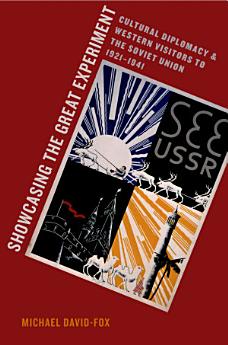Showcasing the Great Experiment: Cultural Diplomacy and Western Visitors to the Soviet Union, 1921-1941
ต.ค. 2011 · Oxford University Press
eBook
448
หน้า
family_home
มีสิทธิ์
info
reportคะแนนและรีวิวไม่ได้รับการตรวจสอบยืนยัน ดูข้อมูลเพิ่มเติม
เกี่ยวกับ eBook เล่มนี้
During the 1920s and 1930s thousands of European and American writers, professionals, scientists, artists, and intellectuals made a pilgrimage to experience the "Soviet experiment" for themselves. Showcasing the Great Experiment explores the reception of these intellectuals and fellow-travelers and their cross-cultural and trans-ideological encounters in order to analyze Soviet attitudes towards the West. Many of the twentieth century's greatest writers and thinkers, including Theodore Dreiser, André Gide, Paul Robeson, and George Bernard Shaw, notoriously defended Stalin's USSR despite the unprecedented violence of its prewar decade. While many visitors were profoundly affected by their Soviet tours, so too was the Soviet system. The early experiences of building showcases and teaching outsiders to perceive the future-in-the-making constitute a neglected international part of the emergence of Stalinism at home. Michael David-Fox contends that each side critically examined the other, negotiating feelings of inferiority and superiority, admiration and enmity, emulation and rejection. By the time of the Great Purges, these tensions gave way to the dramatic triumph of xenophobia and isolationism; whereas in the twenties the new regime assumed it had much to learn from Western modernity, by the Stalinist thirties the Soviet order was declared superior in all respects. Drawing on the declassified archival records of the agencies charged with crafting the international image of communism, David-Fox shows how Soviet efforts to sell the Bolshevik experiment abroad through cultural diplomacy shaped and were, in turn, shaped by the ongoing project of defining the Soviet Union from within. These interwar Soviet methods of mobilizing the intelligentsia for the international ideological contest, he argues, directly paved the way for the cultural Cold War.
เกี่ยวกับผู้แต่ง
Michael David-Fox is Professor in the Department of History and School of Foreign Service at Georgetown University. He is the author of Revolution of the Mind: Higher Learning among the Bolsheviks, 1918-1929 and a founding editor of Kritika: Explorations in Russian and Eurasian History.
ให้คะแนน eBook นี้
แสดงความเห็นของคุณให้เรารับรู้
ข้อมูลในการอ่าน
สมาร์ทโฟนและแท็บเล็ต
ติดตั้งแอป Google Play Books สำหรับ Android และ iPad/iPhone แอปจะซิงค์โดยอัตโนมัติกับบัญชีของคุณ และช่วยให้คุณอ่านแบบออนไลน์หรือออฟไลน์ได้ทุกที่
แล็ปท็อปและคอมพิวเตอร์
คุณฟังหนังสือเสียงที่ซื้อจาก Google Play โดยใช้เว็บเบราว์เซอร์ในคอมพิวเตอร์ได้
eReader และอุปกรณ์อื่นๆ
หากต้องการอ่านบนอุปกรณ์ e-ink เช่น Kobo eReader คุณจะต้องดาวน์โหลดและโอนไฟล์ไปยังอุปกรณ์ของคุณ โปรดทำตามวิธีการอย่างละเอียดในศูนย์ช่วยเหลือเพื่อโอนไฟล์ไปยัง eReader ที่รองรับ





